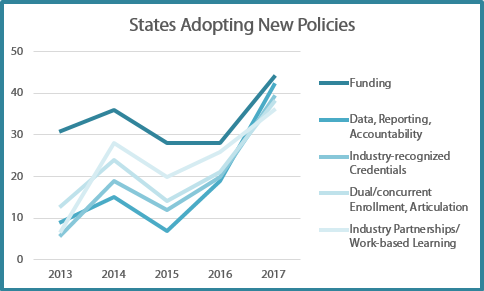February marks the release of the 2023 Year In Review, the 11th edition of this comprehensive report developed by Advance CTE in collaboration with the Association for Career and Technical Education (ACTE). Dedicated to providing a thorough overview of state Career Technical Education (CTE) policies, this report is valuable for state and local administrators and practitioners to better understand national trends and specific policy actions taken by individual state legislatures in 2023.
The policy tracking conducted for 2023 Year In Review totaled 115 policies implemented in 47 states. The report highlights innovative and practical legislation and emphasizes common policy themes. Notably, clean and renewable energy emerges as a prominent focus among policymakers, reflecting the emerging workforce demands of this sector while highlighting the dynamic landscape of CTE. Building upon the legacy of previous reports, the 2023 Year In Review offers insights into the top five policy areas in 2023:
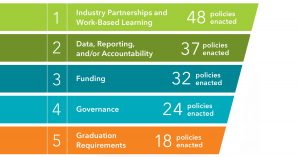
“Industry Partnerships and Work-Based Learning” was the predominant policy category in 2023, with 48 policies enacted under this topic. This category first took the top spot last year after multiple years of the funding category being the most popular. Many policies in this category focused on engaging industry to drive student learning that addresses workforce needs. The following policies illustrate strategies that address labor shortage by fostering industry engagement and enhancing the learner experience through work-based learning opportunities:
Arkansas
S.B. 294 mandates the Division of Elementary and Secondary to establish career-ready pathways for high school diplomas. These pathways include rigorous academic courses and modern career and technical studies aligned with labor market needs, leading to industry credentials. These initiatives address labor shortages by ensuring that students are equipped with skills that meet industry demands through practical work-based learning experiences, thereby bridging the gap between education and employment.
Maryland
S.B. 104 creates the Apprenticeship 2030 Commission to expand registered apprenticeships in sectors with skill shortages. The goal is to increase registered apprenticeships to 60,000 by 2030 and have 45% of high school graduates complete high school-level apprenticeships. By fostering apprenticeships, the policy aims to provide career pathways for young people while addressing industry needs through hands-on training and mentorship, thereby reducing skills shortages.
Vermont
H.B. 452 establishes the Vermont Registered Apprenticeship Program to regulate apprenticeship programs aligned with industry demand. This program oversees apprenticeship, pre-apprenticeship, and youth apprenticeship initiatives. The policy directly addresses labor shortages through structured apprenticeship programs by preparing individuals with the specific skills demanded by industries, ensuring a better alignment between workforce supply and industry demand.
For a comprehensive exploration of the policies enacted this year, Advance CTE offers an accompanying online tracker. This tool empowers users to search and filter for specific legislation, providing a more in-depth understanding of the enacted policies.

The 2023 Year In Review strives to contribute to the ongoing dialogue on CTE, showcasing successful strategies, and fostering collaboration among stakeholders in the field. CTE leaders are encouraged to utilize the tracker and state highlights in their respective states and communities for more strategies to implement potentially innovative policies.
As a Policy Associate, Velie conducts research and develops resources to support Advance CTE’s state policy initiatives, including the New Skills ready network, the annual Year in Review, and the Green Workforce.


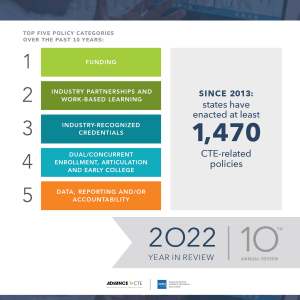
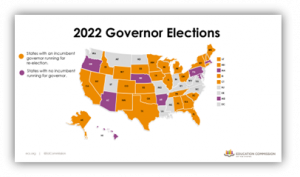 With over 30 gubernatorial elections and legislative elections in all but four states, 2022 will likely lead to
With over 30 gubernatorial elections and legislative elections in all but four states, 2022 will likely lead to 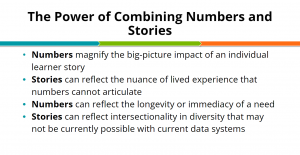 This session featuring Advance CTE and Edge Research inspired attendees to amplify learner outcome data and testimonials to create impactful data stories. Attendees were reminded to be in the driver’s seat on creating data ‘headlines’’ and to be proactive in addressing assumptions others might make about data. First step routines were also provided, such as mapping schedules for quantitative and qualitative data collection, quantitative data reporting and qualitative data access opportunities and comparing timelines with storytelling opportunities.
This session featuring Advance CTE and Edge Research inspired attendees to amplify learner outcome data and testimonials to create impactful data stories. Attendees were reminded to be in the driver’s seat on creating data ‘headlines’’ and to be proactive in addressing assumptions others might make about data. First step routines were also provided, such as mapping schedules for quantitative and qualitative data collection, quantitative data reporting and qualitative data access opportunities and comparing timelines with storytelling opportunities. 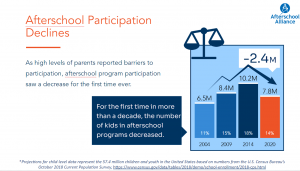 Edge Research provided storytelling tips — one included creating three to five headlines that encompass a data point audiences might not expect, highlight the most urgent findings, and provide a call to action. It is important to humanize qualitative data through phrases such as ‘1 out of X families’ or ‘X number of children need Y’.
Edge Research provided storytelling tips — one included creating three to five headlines that encompass a data point audiences might not expect, highlight the most urgent findings, and provide a call to action. It is important to humanize qualitative data through phrases such as ‘1 out of X families’ or ‘X number of children need Y’. 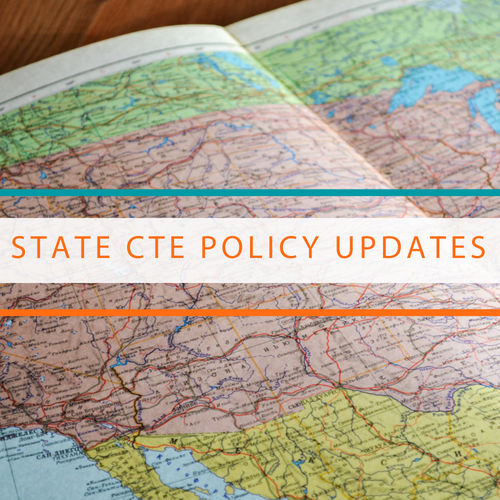 State education agencies, legislators and educators faced significant challenges from
State education agencies, legislators and educators faced significant challenges from  On the federal and state levels, 2019 was an important year for Career Technical Education (CTE). In addition to creating their four-year state plans for the federal Strengthening Career and Technical Education for the 21st Century Act (Perkins V), at least 45 states and Palau enacted at least 208 policy actions related to CTE and career readiness.
On the federal and state levels, 2019 was an important year for Career Technical Education (CTE). In addition to creating their four-year state plans for the federal Strengthening Career and Technical Education for the 21st Century Act (Perkins V), at least 45 states and Palau enacted at least 208 policy actions related to CTE and career readiness.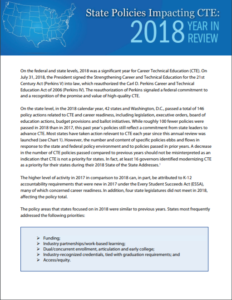 2018 was a significant year for Career Technical Education (CTE) at the federal and state levels. On July 31, 2018, the President signed the Strengthening Career and Technical Education for the 21st Century Act (Perkins V) into law, which reauthorized the Carl D. Perkins Career and Technical Education Act of 2006 (Perkins IV). The reauthorization of Perkins signaled a federal commitment to and a recognition of the promise and value of high-quality CTE. Additionally, at the state level 42 states and Washington, D.C., passed a total of 146 policy actions related to CTE and career readiness, reflecting a commitment from state leaders to advance CTE.
2018 was a significant year for Career Technical Education (CTE) at the federal and state levels. On July 31, 2018, the President signed the Strengthening Career and Technical Education for the 21st Century Act (Perkins V) into law, which reauthorized the Carl D. Perkins Career and Technical Education Act of 2006 (Perkins IV). The reauthorization of Perkins signaled a federal commitment to and a recognition of the promise and value of high-quality CTE. Additionally, at the state level 42 states and Washington, D.C., passed a total of 146 policy actions related to CTE and career readiness, reflecting a commitment from state leaders to advance CTE.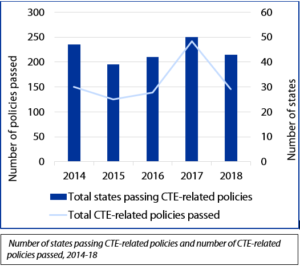 While roughly one hundred fewer policies were passed in 2018 than in 2017, this past year’s policies still reflect a commitment from state leaders to advance CTE. A decrease in the number of CTE policies passed compared to previous years should not be misinterpreted as an indication that CTE is not a priority for states. In fact,
While roughly one hundred fewer policies were passed in 2018 than in 2017, this past year’s policies still reflect a commitment from state leaders to advance CTE. A decrease in the number of CTE policies passed compared to previous years should not be misinterpreted as an indication that CTE is not a priority for states. In fact, 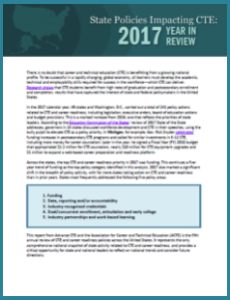 2017 was a banner year for Career Technical Education (CTE). Overall, 49 states and the District of Columbia passed a total of 241 policies related to CTE and career readiness, a marked increase from 2016. But while it is encouraging to see a groundswell of enthusiasm for CTE at the local, state and national levels, how will states leverage CTE’s momentum and ensure that state action translates to better outcomes for students?
2017 was a banner year for Career Technical Education (CTE). Overall, 49 states and the District of Columbia passed a total of 241 policies related to CTE and career readiness, a marked increase from 2016. But while it is encouraging to see a groundswell of enthusiasm for CTE at the local, state and national levels, how will states leverage CTE’s momentum and ensure that state action translates to better outcomes for students? 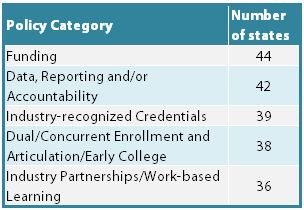 There was also a lot of activity related to data, reporting and accountability, largely due to state work around the Every Student Succeeds Act (ESSA). In 2017, 35 states identified measures of career readiness in their federal accountability systems, and many of these measures included industry-recognized credential attainment, dual-credit completion and work-based learning participation.
There was also a lot of activity related to data, reporting and accountability, largely due to state work around the Every Student Succeeds Act (ESSA). In 2017, 35 states identified measures of career readiness in their federal accountability systems, and many of these measures included industry-recognized credential attainment, dual-credit completion and work-based learning participation.